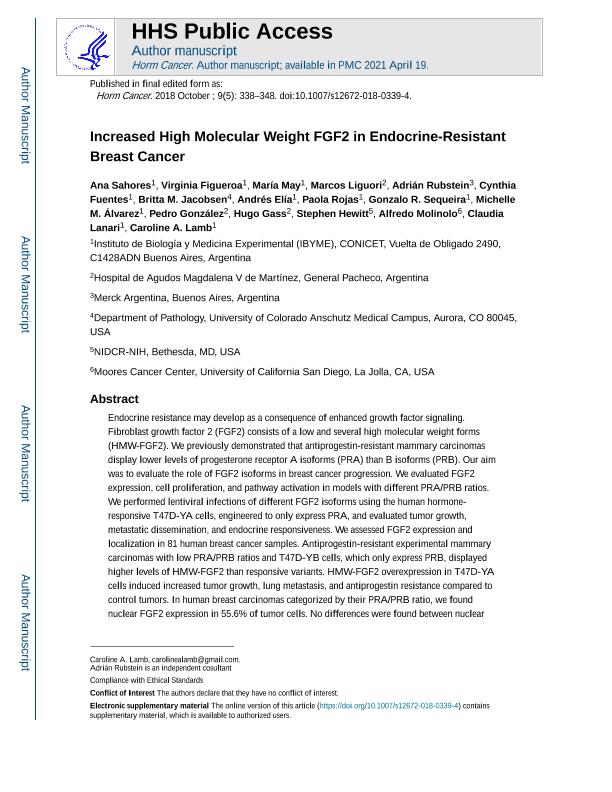Artículo
Increased high molecular weight FGF2 in endocrine-resistant breast cancer
Sahores, Ana ; Figueroa, Virginia
; Figueroa, Virginia ; May, Maria
; May, Maria ; Liguori, Marcos; Rubstein, Adrián; Fuentes, Cynthia Analia
; Liguori, Marcos; Rubstein, Adrián; Fuentes, Cynthia Analia ; Jacobsen, Britta M.; Elia, Andres Maximiliano
; Jacobsen, Britta M.; Elia, Andres Maximiliano ; Rojas, Paola Andrea
; Rojas, Paola Andrea ; Sequeira, Gonzalo Ricardo
; Sequeira, Gonzalo Ricardo ; Álvarez, Michelle M.; González, Pedro; Gass, Hugo; Hewitt, Stephen; Molinolo, Alfredo; Lanari, Claudia Lee Malvina
; Álvarez, Michelle M.; González, Pedro; Gass, Hugo; Hewitt, Stephen; Molinolo, Alfredo; Lanari, Claudia Lee Malvina ; Lamb, Caroline Ana
; Lamb, Caroline Ana
 ; Figueroa, Virginia
; Figueroa, Virginia ; May, Maria
; May, Maria ; Liguori, Marcos; Rubstein, Adrián; Fuentes, Cynthia Analia
; Liguori, Marcos; Rubstein, Adrián; Fuentes, Cynthia Analia ; Jacobsen, Britta M.; Elia, Andres Maximiliano
; Jacobsen, Britta M.; Elia, Andres Maximiliano ; Rojas, Paola Andrea
; Rojas, Paola Andrea ; Sequeira, Gonzalo Ricardo
; Sequeira, Gonzalo Ricardo ; Álvarez, Michelle M.; González, Pedro; Gass, Hugo; Hewitt, Stephen; Molinolo, Alfredo; Lanari, Claudia Lee Malvina
; Álvarez, Michelle M.; González, Pedro; Gass, Hugo; Hewitt, Stephen; Molinolo, Alfredo; Lanari, Claudia Lee Malvina ; Lamb, Caroline Ana
; Lamb, Caroline Ana
Fecha de publicación:
10/2018
Editorial:
Springer US
Revista:
Hormones and Cancer
ISSN:
1868-8500
Idioma:
Inglés
Tipo de recurso:
Artículo publicado
Clasificación temática:
Resumen
Endocrine resistance may develop as a consequence of enhanced growth factor signaling. Fibroblast growth factor 2 (FGF2) consists of a low and several high molecular weight forms (HMW-FGF2). We previously demonstrated that antiprogestin-resistant mammary carcinomas display lower levels of progesterone receptor A isoforms (PRA) than B isoforms (PRB). Our aim was to evaluate the role of FGF2 isoforms in breast cancer progression. We evaluated FGF2 expression, cell proliferation, and pathway activation in models with different PRA/PRB ratios. We performed lentiviral infections of different FGF2 isoforms using the human hormone-responsive T47D-YA cells, engineered to only express PRA, and evaluated tumor growth, metastatic dissemination, and endocrine responsiveness. We assessed FGF2 expression and localization in 81 human breast cancer samples. Antiprogestin-resistant experimental mammary carcinomas with low PRA/PRB ratios and T47D-YB cells, which only express PRB, displayed higher levels of HMW-FGF2 than responsive variants. HMW-FGF2 overexpression in T47D-YA cells induced increased tumor growth, lung metastasis, and antiprogestin resistance compared to control tumors. In human breast carcinomas categorized by their PRA/PRB ratio, we found nuclear FGF2 expression in 55.6% of tumor cells. No differences were found between nuclear FGF2 expression and Ki67 proliferation index, tumor stage, or tumor grade. In low-grade tumor samples, moderate to high nuclear FGF2 levels were associated to carcinomas with low PRA/PRB ratio. In conclusion, we show that HMW-FGF2 isoforms are PRB targets which confer endocrine resistance and are localized in the nuclei of breast cancer samples. Hence, targeting intracellular FGF2 may contribute to overcome tumor progression.
Archivos asociados
Licencia
Identificadores
Colecciones
Articulos(CINDECA)
Articulos de CENTRO DE INV EN CS.APLICADAS "DR.JORGE J.RONCO"
Articulos de CENTRO DE INV EN CS.APLICADAS "DR.JORGE J.RONCO"
Articulos(IBYME)
Articulos de INST.DE BIOLOGIA Y MEDICINA EXPERIMENTAL (I)
Articulos de INST.DE BIOLOGIA Y MEDICINA EXPERIMENTAL (I)
Articulos(ININFA)
Articulos de INST.DE INVEST.FARMACOLOGICAS (I)
Articulos de INST.DE INVEST.FARMACOLOGICAS (I)
Citación
Sahores, Ana; Figueroa, Virginia; May, Maria; Liguori, Marcos; Rubstein, Adrián; et al.; Increased high molecular weight FGF2 in endocrine-resistant breast cancer; Springer US; Hormones and Cancer; 9; 5; 10-2018; 338-348
Compartir
Altmétricas



